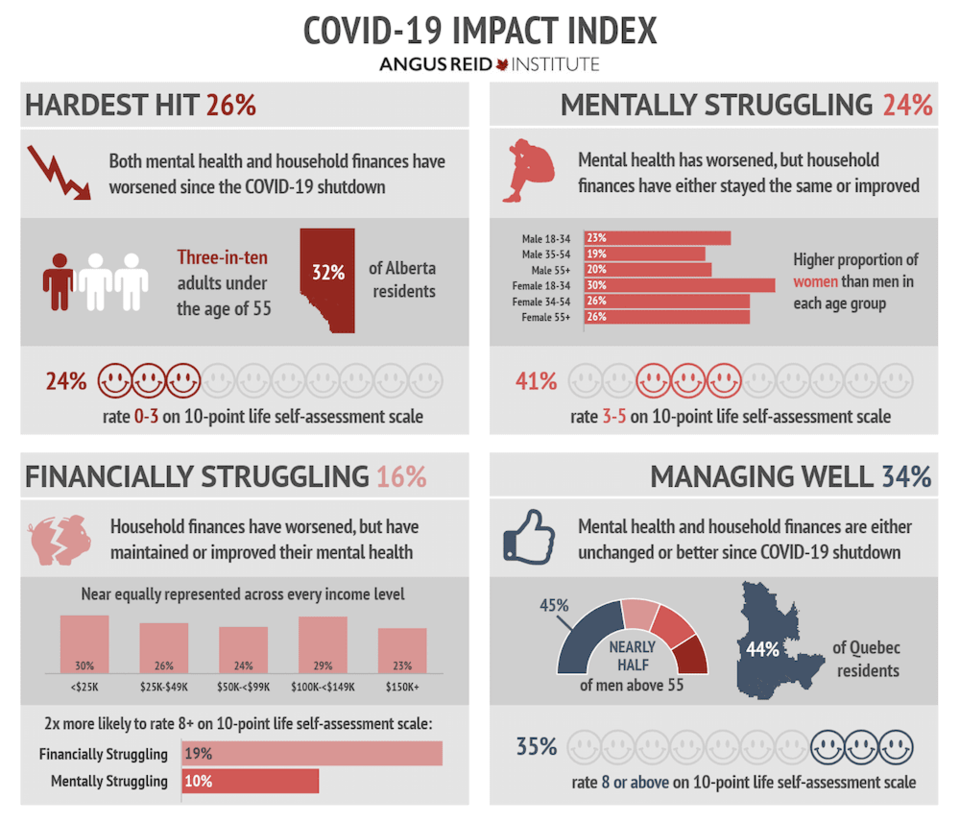As Canadians strive to stay physically healthy during the COVID-19 pandemic, many of them are fearful of what the future holds.
Given the unprecendented circumstances of the health crisis, many people feel anxious and stressed and may not know how to manage their emotions. What's more, a new study finds that half of Canadians report a worsening of their mental health.
Conducted by the Angus Reid Institute, a not-for-profit public opinion research organization based in Vancouver, the study reports that, "The combination of deteriorating mental health and ongoing financial troubles at the household level creates a portrait of how the nation is faring through the crisis."
Of those who reported their mental health had worsened, one-in-ten respondents stated that their mental health had worsened "a lot." In addition, two-in-five (42%) say that their physical health has diminished due to inactivity.
The study also found that Canadians were most likely to report feeling: worried (44%), anxious (41%), bored (30%), and grateful (34%). With this in mind, women were more likely to report feeling worried and anxious than men, but they were also more likely to report feeling grateful. Men, on the other hand, were more likely to report feeling optimistic. The highest number of affected individuals were women agesd 18 to 54, who the study notes are consistenly found to be caring more for children and parents, and may be experiencing increased stress.
According to Angus Reid's Impact Index, Canadians fall into four main categories: those who are Managing Well mentally and financially, those who are Mentally Struggling, or Financially Struggling, and those who are Hardest Hit, feeling the effects of both factors worse than anyone else.
 According to Angus Reid's Impact Index, Canadians fall into four main categories: those who are Managing Well mentally and financially, those who are Mentally Struggling, or Financially Struggling, and those who are Hardest Hit, feeling the effects of both factors worse than anyone else. Photo: Angus Reid Institute
According to Angus Reid's Impact Index, Canadians fall into four main categories: those who are Managing Well mentally and financially, those who are Mentally Struggling, or Financially Struggling, and those who are Hardest Hit, feeling the effects of both factors worse than anyone else. Photo: Angus Reid Institute The study finds that one-quarter (24%) of the Hardest Hit say that their relationships at home have suffered since the COVID-19 outbreak began, compared to just six per cent of those in the Managing Well group. Respondents say that relationships with people outside of their home have taken a turn for the worst, with one-in-three reporting that these relationships had worsened. With this in mind, the majority of Canadians report that the increased time with people in their household does not appear to be damaging these relationships.
Regionally, Quebec residents were found most likely to be Managing Well, while Albertans most likely to be among the Hardest Hit. In terms of financial assistance from the government, "two-in-five (38%) of those who have applied say they are relying on these programs entirely to get by. Another 35 per cent say the programs are helping a lot."
Regardless of whether they are struggling mentally or financially, Canadians across all four of categories of the Impact Index agree that it is too early to lift COVID-19 restrictions in their respective province.



